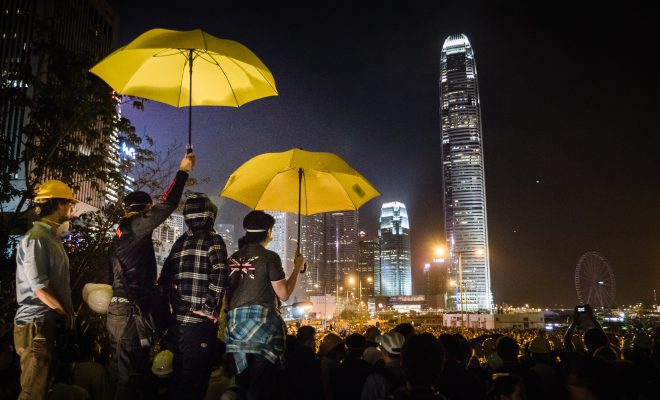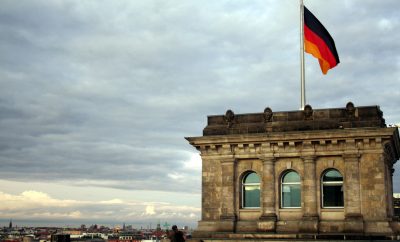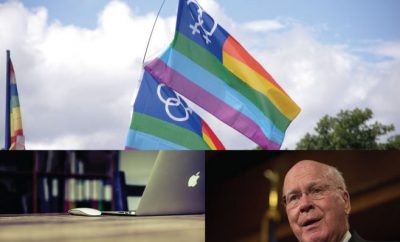 Image courtesy of Studio Incendo; License: (CC BY 2.0)
Image courtesy of Studio Incendo; License: (CC BY 2.0)
World
Thousands Protest as China Blocks Pro-Independence Lawmakers in Hong Kong
China’s central government issued an interpretation of Hong Kong’s mini-constitution on Monday, effectively blocking two pro-independence legislators from joining the semi-autonomous region’s Legislative Council. Yau Wai-ching, 25, and Baggio Leung, 30, were elected to the rule-making body in September, nearly two years after pro-democracy protests gripped the former British colony.
Coalescing around the Chinese government’s liaison office, thousands of Hong Kong citizens preemptively took to the streets to protest the impending decision on Sunday evening. Like the pro-democracy protests of 2014, many wielded yellow umbrellas, as policemen attempted to combat the horde with pepper spray.
Yau and Leung were involved in a pending court case before Beijing stepped in to issue its own interpretation of the Basic Law, Hong Kong’s judicial code that was hammered out before it was granted semi-autonomy from the mainland in 1997. Yau and Leung were in court to determine if they could redo their oaths of office because both altered the wording when being sworn into the council. They said “Chee-na,” a derogatory term used by the Japanese in World War II, instead of “China.”
Through the state-run Xinhua news agency, Beijing’s National People’s Congress espoused its interpretation of Article 104 of the Basic Law. The report said:
An oath taker who intentionally reads out words which do not accord with the wording of the oath prescribed by law, or takes the oath in a manner which is not sincere or not solemn, shall be treated as declining to take the oath. The oath so taken is invalid and the oath taker is disqualified forthwith from assuming the public office specified in the Article.
This is the first time Beijing has issued its interpretation of a pending court case in Hong Kong, unprompted, since 1997. The move was legal, however, according to the charter that was negotiated before British handed Hong Kong over to the mainland, which stated an interpretation of the Basic Law by China’s Parliament supersedes that of Hong Kong’s highest court.
Police in Hong Kong fired pepper spray at protesters after Beijing barred 2 recently elected pro-independence lawmakers from taking office. pic.twitter.com/rSCB9LaZS6
— AJ+ (@ajplus) November 7, 2016
“This incident shows us the Basic Law is a handicapped legal document and the so-called mini-constitution can be amended and controlled by the Chinese Communist Party at will,” said 20-year-old Joshua Wong, one of the leaders of the 2014 protests that ultimately vaulted at least six pro-independence candidates, including Yau and Leung, to the 70-member Legislative Council.
Under the “one country, two systems” code, Hong Kong’s Basic Law guarantees the region’s own judicial freedom from the Communist mainland. And although the Legislative Council’s leader is pro-Beijing and the body itself is still largely comprised of lawmakers cozy to the capital, a younger crop of pro-independence leaders, many of whom lack experience but were spurred to run by the 2014 movement, are taking root.
But as a new wave of protestors hit the streets to protest a move they see as a breach of their autonomy (“Hong Kong independence,” some protestors shouted), Beijing might have set a precedent for years to come. Yau and Leung ran successful campaigns under this slogan: “Hong Kong is not China.” To Beijing, that is more than just a catchphrase. It’s a threat to be taken seriously.








Comments